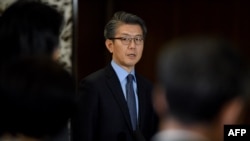Senior officials from the United States, Japan, and South Korea convene in historic Little Washington, Virginia, on Friday, amid growing threats from North Korea and other pressing regional and global security issues.
U.S. Deputy Secretary of State Kurt Campbell hosts Japan’s Vice Foreign Minister Masataka Okano, and South Korea's Vice Foreign Minister Kim Hong Kyun at his farmhouse nestled in the foothills of the Blue Ridge Mountains near Washington.
The trilateral dialogue, a key deliverable from the historic 2023 Camp David Summit, reaffirms cooperation on economic security, critical and emerging technologies, and maritime security.
It also addresses various regional and global challenges, including North Korean threats, Russia's war on Ukraine, stability in the Taiwan Strait, and humanitarian aid for civilians in Gaza, according to the State Department.
The latest trilateral talks follow North Korea's launch of suspected ballistic missiles toward its eastern sea May 30, reported by South Korea's military.
The launches occurred shortly after the country's unsuccessful attempt to launch a military reconnaissance satellite and after North Korean balloons dropped feces and garbage on South Korea's busy streets and public areas.
“Any kind of aerial object, certainly, we would find destabilizing and provocative, and we continue to consult closely with the Republic of Korea and Japan against these kinds of malign and destabilizing behaviors,” said State Department Deputy Spokesperson Vedant Patel during a briefing on Thursday.
“We condemn the DPRK’s May 29th ballistic missile launch,” he noted, referring to North Korea by its official name, the Democratic People’s Republic of Korea.
Friday's talks follow the recent revival of high-level dialogue among China, Japan, and South Korea after almost five years.
The countries are expected to discuss the outcomes of the trilateral summit held in Seoul on Monday, attended by South Korean President Yoon Suk Yeol, Japanese Prime Minister Fumio Kishida, and Chinese Premier Li Qiang.
Former U.S. intelligence officials and analysts said the alliance between Washington, Tokyo, and Seoul is especially crucial amid rising military threats from the People’s Republic of China.
James Fanell, a retired U.S. Navy captain and former director of intelligence and information operations for the U.S. Pacific Fleet, said, “Given the current military threats from the PRC, as exemplified by last week’s large-scale drills near Taiwan, and the ongoing rapid military buildup, all three nations should break free from incremental changes and adopt a much more assertive approach to regional security.”
Others told VOA that countries in the region are not only worried about the economic fallout from any type of war, citing the importance of maintaining the status quo of the Taiwan Strait as an international waterway, but they also are very concerned about immediate Chinese threats following a potential forcible takeover of Taiwan.
"If China were to take Taiwan by force, then Chinese forces would be that much closer to their outlying territories. Especially in Japan, there's a fear that this would be the first step toward Chinese seizure of some of the southwestern islands,” said Jennifer Kavanagh, a senior fellow at the Carnegie Endowment for International Peace.
On Friday morning, U.S. Deputy Secretary of State Campbell met with South Korea’s vice foreign minister, Kim, for a bilateral discussion.
The previous day, the State Department’s second-ranking diplomat held an inaugural vice-ministerial meeting with his Japanese counterpart, Okano, to focus on infrastructure development cooperation in other countries. That initiative is widely viewed as a key part of the two allies' strategy to counter China's influence in Southeast Asia and beyond.






